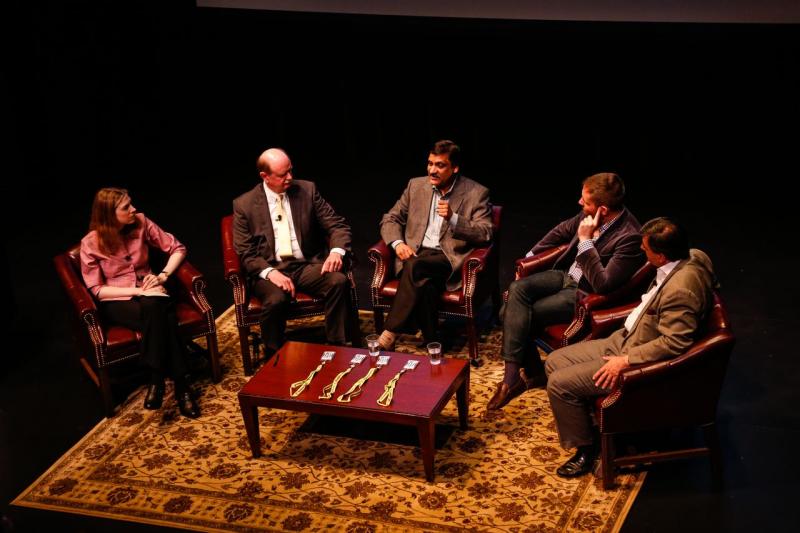
From left to right: Kara Miller of Innovation Hub, Richard Miller of Olin College, Anant Agarwal of edX, Peter Hopkins of Big Think, and Eric Mazur of Harvard chat at Innovation Hub's live event, College 2.0. Credit: Michael J. Clarke
Guests:
- Richard Miller, President of Olin College
- Anant Agarwal, President of edX
- Eric Mazur, Professor of Physics at Harvard University and one of the world's pioneers in flipping the classroom
- Peter Hopkins, President of Big Think, which has launched at Yale, Bard, and Harvard
For students around the country, the last days of August and the beginning of fall mean one thing: back to school. This season, shake-ups in the world of higher education have dominated the news--from President Obama's recent plan to cut college costs to changes in student loan laws.
In this College 2.0 Labor Day Special, we asked a panel of experts how the rise of technology in the classroom and innovative new methods of instruction may actually dismantle the concept of the "classroom" as we know it. This year, as students haul futons and mini fridges into dorms, consider the possibility that they're an endangered species. One day, frisbee-playing and reading on the quad may be little more than a hazy memory - a symbol of a time before college went high-tech.
A year and a half ago, if you had asked Anant Agarwal, the President of edX, about the biggest innovation in education, he would have pointed to technology that's half a millennium old: the printing press and the textbook. Not much else had changed since then, he says: “We still go to lecture, sit in front of a lecture hall, the professor talks, and after five minutes you fall asleep.”
That is, until now. In the last year and a half, the world of education has been shaken up from top to bottom, changing both the ways teachers teach and students learn. Move over, Gutenberg—Agarwal says the decade of education innovation has just begun.
Scroll to the bottom of this page for video of the entire event!

Rising student loan debt may push many students toward more affordable online education options, like edX. Credit: Mark Kantrowitz
Is Your Education Worth $250,000?
One of the newest and most controversial innovations in higher education is the massive, open-enrollment online course, or "MOOC." Peter Hopkins, President of Big Think, says that MOOCs could be a great equalizer in higher education, especially in an age when college costs--and student debt--are rising. "If you're sitting in one of those classrooms, Michael Sandel's Justice class, you're paying $250,000 to be there. Somebody now pays nothing to get the same experience." With free online programs like edX, which provides course lectures from professors at universities like Harvard, Georgetown, and MIT for free online, students all over the world could theoretically acquire the same knowledge and skills as students at brick-and-mortar universities.
The question is—will they? Richard Miller, president of Olin College, points out that it’s already possible to know everything a PhD does– just go to a library and check out the books. The reason it doesn’t happen is usually because of a lack of intrinsic motivation, he argues, not access to resources - a challenge that is sure to plague online education in the future.

Though online courses like Introduction to Computer Science (CS50) with David Malan from Harvard have extremely high enrollment rates, only a fraction of those students complete the entire program and receive certificates. Credit: David Malan/Zhe Lu
Flipping the Classroom
When Eric Mazur first began as a physics professor at Harvard, he taught his classes the same way he had been taught: by lecturing. But when his students had trouble internalizing even on basic concepts in the curriculum, he realized the approach was just not working. “If you take a gorilla and had a gorilla press random keys on that test, the gorilla does better than some of my Harvard students,” he recalls.
The experience was an awakening for Mazur, who tried a new method of instruction. Instead of lecturing his students, he “flipped” his classroom by having students solve a problem on their own and then explain the solution to their peers. The result, Mazur says, was a more solid grasp of concepts and a renewed sense of curiosity and enthusiasm for the subject.
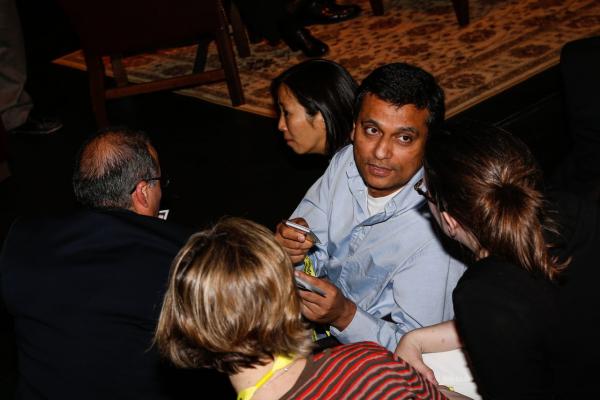
Eric Mazur flipped the lecture hall at our Innovation Hub live event. Here, audience members explain their solutions to a statistics problem to each other. Credit: Michael J. Clarke
Mazur worries that online classes which follow the same old, lecture-based format will be just as ineffective as their traditional counterparts, no matter how good the production value. “The key point is not so much 'how do we make teaching as glossy as possible?' No. It’s 'how do we create a desire to learn?'”
At our live Innovation Hub event at Suffolk University on June 4, Mazur gave the audience a taste of what it was like to sit in one of his “flipped” classrooms. Scroll down to try the problem for yourself. When you're finished, scroll down further for the solution (no peeking!)
The Problem:
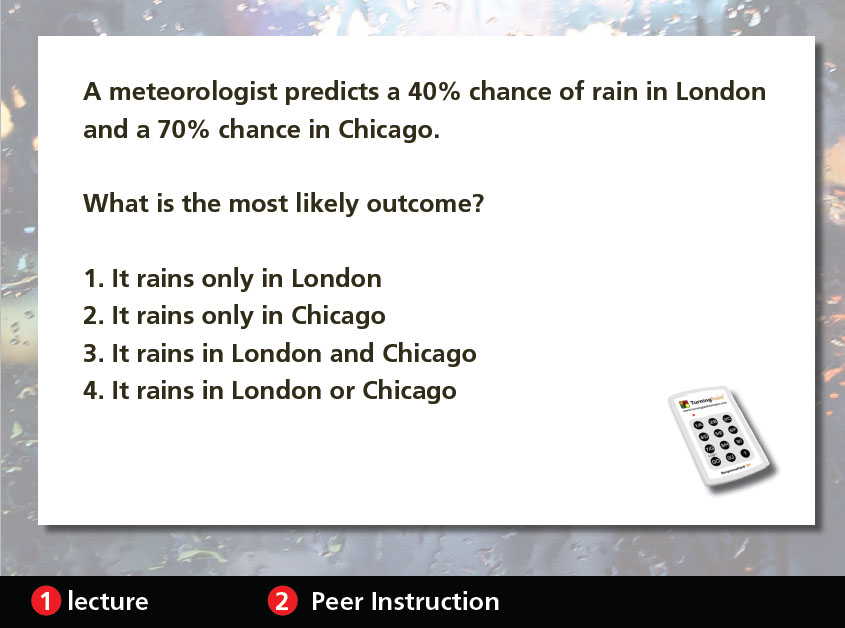
Credit: Eric Mazur
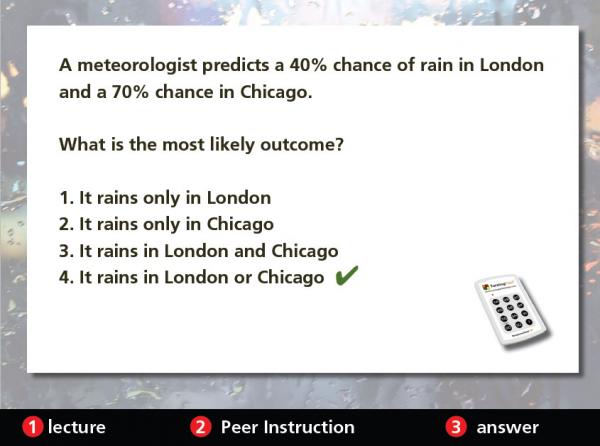
Credit: Eric Mazur

Credit: Eric Mazur
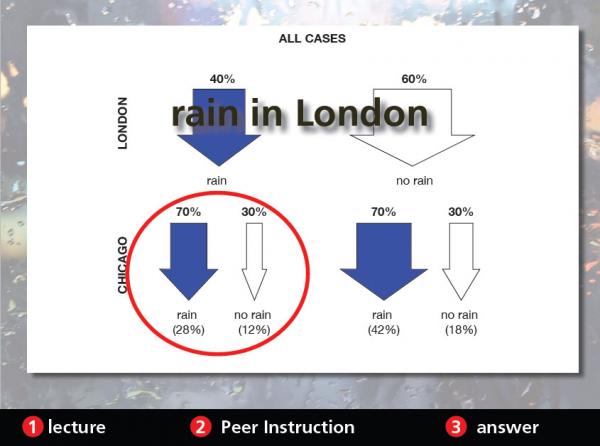
Credit: Eric Mazur
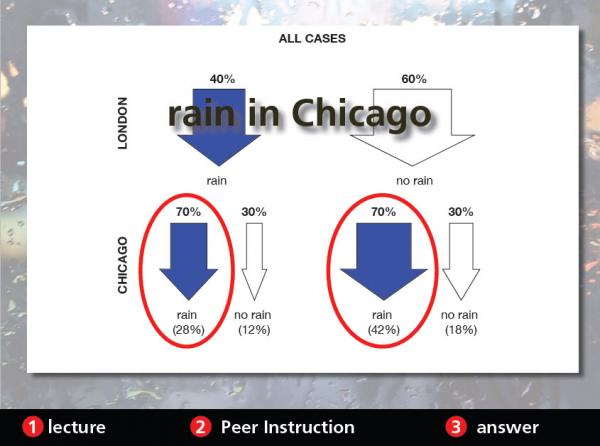
Credit: Eric Mazur
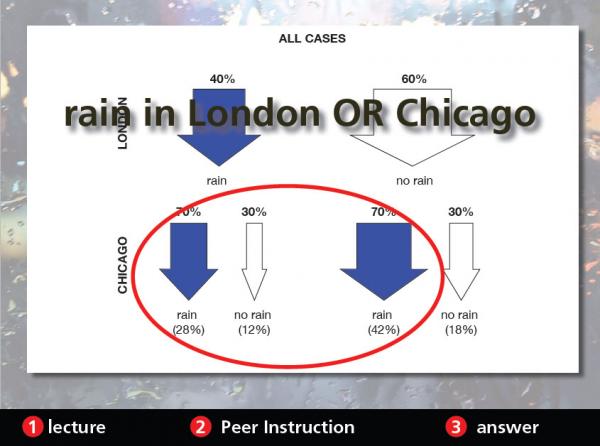
Credit: Eric Mazur
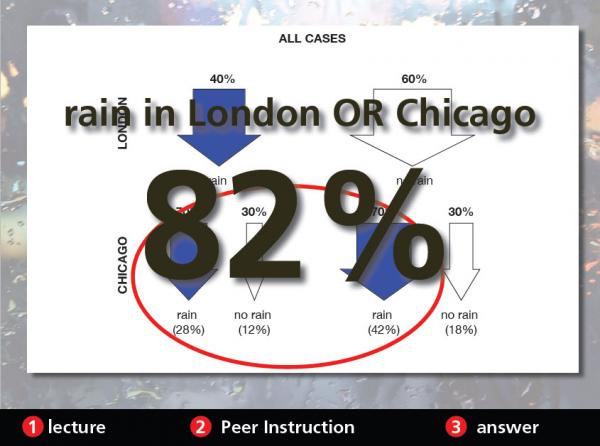
Credit: Eric Mazur
For Further Reading:
- Suffolk University President James McCarthy, who joined us for our discussion, afterwards wrote an op-ed in The Boston Globe on the role MOOCs can (and should) play in revolutionizing college.
- The Boston Review published a series of articles all about MOOCs. Check out the series here.
- Read the open letter from the faculty of San Jose State University to Harvard professor Michael Sandel, which is critical of his involvement in edX.
- "Why We Fear MOOCs," an op-ed by Regent University assistant professor Mary Manjikian in defense of MOOCs.

